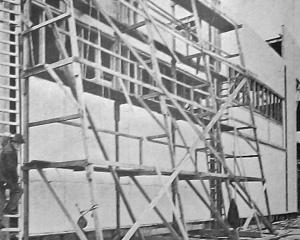Frustrated local government leaders say they want more time to get the big jobs done. We should hear them out — but they must convince us that more time is the answer to what ails them.
Local Government New Zealand will ask the Government to hold a referendum on whether to extend local and central government terms from three years to four.
It is the first time local government has asked this but not the first time many have complained about a term they consider insufficient for councils to complete important plans and projects.
It can take months and often years for big spends to be investigated and planned, consulted upon and then debated, before they are eventually included in long-term spending plans.
If a project is lucky enough to somehow be fast-tracked through one council term, it is also likely whatever council emerges from the next election will want to take another look. Then, a project that seemed a certainty might slip back into months of re-examination and debate, before it is re-confirmed or abandoned altogether.
Our councils’ 10-year, long-term planning processes help many important projects survive their journey between council terms. It also lets new councils drop them altogether.
That successive councils can take another look at past councils’ decisions is not a bad thing — in fact, it is a necessary part of what drives our robust local democracy.
Unpopular or unwise decisions can be undone by collective voter action: new councillors are often elected on promises to re-examine and abandon what ratepayers do not like.
By and large, local government politicians respect the need for inter-term flexibility to ensure councils stay on the right track. Dynamism should encourage better decisions.
However, significant spending, especially on big-ticket water and waste projects, usually needs more than one council term to move through the process to the point of commission.
Such projects often come with inter-term rates implications and intergenerational debt, and the need for new councils to accept such long-term work is worth the expense.
LGNZ president Stuart Crosby says this leads to high levels of frustration with the term and the long decision-making process.
These days, councils are engaged in increasingly complex, decades-long tasks that would benefit from the certainty that comes from stability in the council chamber.
Myriad tasks such as climate change planning and economic development, district plans and 3 Waters development, need consistent and concentrated focus.
They assuredly get this from the council staff that explore, promote and develop them, but their progress is only as certain as what happens during the three-year term.
Mr Crosby says a four-year term might minimise the slowdown that came with a new council re-examining old decisions. It would ensure projects were not unnecessarily bogged down.
This has all the hallmarks of the start of an argument that a longer term helps councils deliver their promises, and this will benefit communities that elect can-do councils.
But with the benefits comes the risk communities will get an extra year of inaction — or even damaging action — if they elect councils that cannot use their time wisely.
Promises might be broken, conduct might lead to disgrace, but ratepayers will be stuck with whomever they might otherwise vote out for a year longer than they would have been.
Calls to allow recall elections, in which voters can remove a councillor by direct vote, might re-emerge if LGNZ’s pitch makes it to a referendum, but there is plenty of work to do before then.
The process for change will take time, considerable analysis and lengthy consultation before any proposal makes its way to Parliament.
Like the process it seeks to change, this one may need the co-operation of a couple of governments, and the patience of voters wary of committing to one council for four years.
Comments
Local government needs a complete overhaul. Indeed do we need so many councillors or even any? They are supposed to represent the public but in this day and age with such great communication systems we can represent ourselves. We need to empower the people to encourage to engage in local issues. Empowering councillors more will only fatten and bloat the system more. We need a more agile and efficient local government. The current system is not working, it is like a huge ship with just a few people in charge, full of thousands of cattle but with a great storm heading our way it maybe impossible to keep afloat.
This should be considered as part of a complete revamp of local government. Who actually thinks that the current system works? Massive debt, bitter infighting, lack of governance meaning unelected council career managers become bloated and inefficient, and a general disconnect with voters. The system is broken. And now they want more time to break it even further. I feel few would be in favour of increasing the term to four years and that, in itself, would be a reflection of what people think about local government as a whole.
This is something that the people need to have a say on! As part of any proposal to increase the length of terms, there should also be provisions made to recall elected officials via a special election. A lot of us have "buyer's remorse" with the mayor and councillors elected in the last election. If there were provisions in place to remove some of the dead weight, the process could have been implemented. As it stands, we have a dysfunctional group of individuals "running" the city. Unfortunately, incompetence isn't a crime, so we have no mechanism in place to get ride of them. Additionally, term limits need to be imposed for elected officials. Why do we elect these "washed up" politicians from Wellington to continue their mediocre careers in the local government? They sit on DCC and augment their income while continuing to do nothing. Elected officials need to be limited to 2 consecutive terms; this includes the mayor and councillors. Lastly, given the current economic conditions, the pay structure for all DCC employees needs to be changed. The mayor and councillors are overpaid! Equally, the "CEO" of DCC is a city manager. As such, she should be paid as a city manager not $500k!












